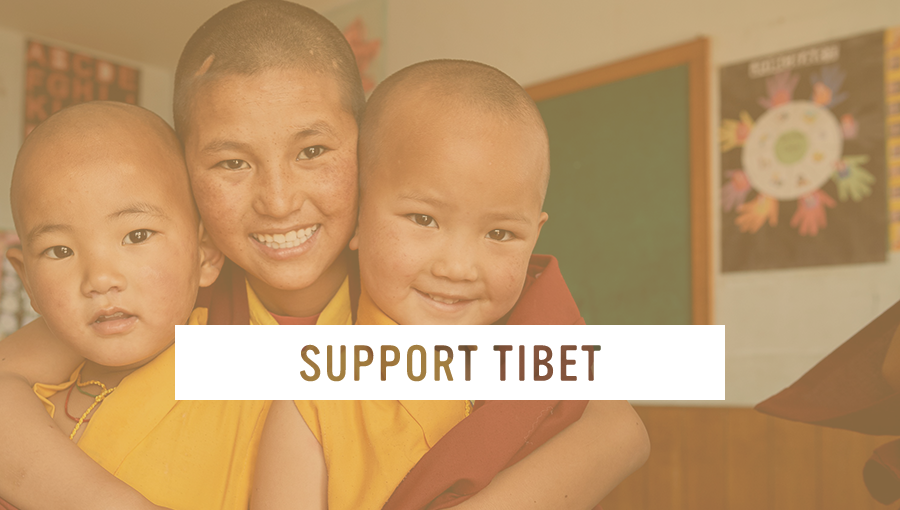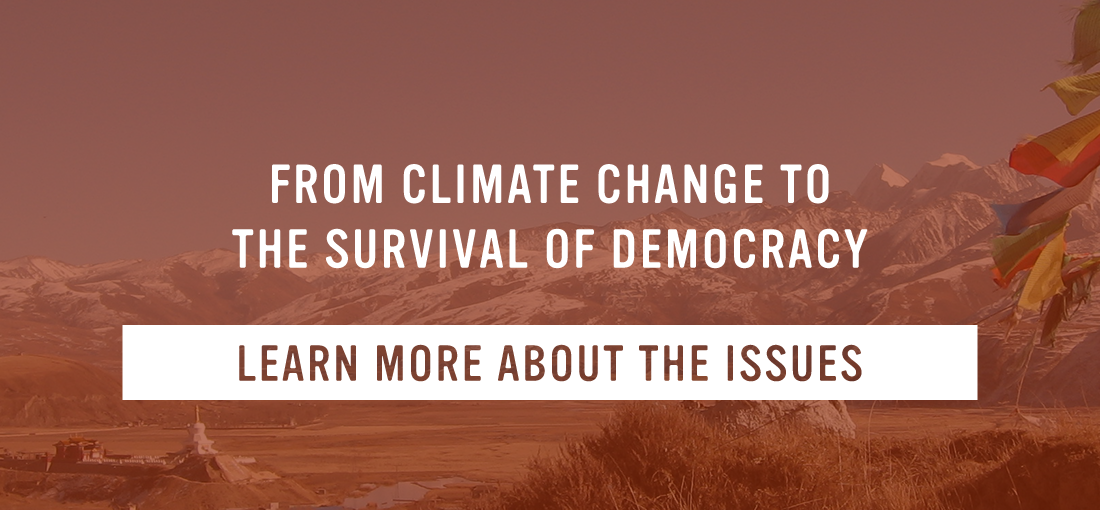WHY TIBET MATTERS
Located north of the Himalayas on Earth’s highest plateau, Tibet was once an isolated country devoted to Buddhist values and led by the Dalai Lama. Today, under Chinese rule, it’s become a hotbed of crises that threaten the entire world.
From climate change to authoritarianism, Tibet is home to the biggest challenges of the 21st century. But its ancient culture of wisdom can help us solve our collective problems—if we take action to save it.
Located north of the Himalayas on Earth’s highest plateau, Tibet was once an isolated country devoted to Buddhist values and led by the Dalai Lama. Today, under Chinese rule, it’s become a hotbed of crises that threaten the entire world.
From climate change to authoritarianism, Tibet is home to the biggest challenges of the 21st century. But its ancient culture of wisdom can help us solve our collective problems—if we take action to save it.
China’s brutal policies are rapidly accelerating climate change in Tibet, increasing the likelihood of global environmental catastrophe. Tibet’s geostrategic importance makes it a vital asset for the Chinese Communist Party as it seeks to expand its authoritarian influence throughout Asia and the world. And the Chinese government is not only denying human rights for Tibetans but also using its power to censor and intimidate people in foreign countries who speak out against China’s repression.
Tibet is in crisis. But wherever you are in the world, what happens in Tibet will impact you.
Learn more about the environment, global security and human rights in Tibet.
Living in one of the most remote parts of Earth, Tibetans developed a unique society based on the Buddhist teachings of compassion, interdependence and nonviolence. Without a doubt, those values would benefit all of us today as we confront the major challenges of the 21st Century.
Unfortunately, the Chinese government is trying to destroy Tibetan culture in order to its control of the region. We have to take action now to save Tibet, because the future of the world depends on it.
“The preservation of Tibetan culture, Tibetan knowledge, is something not only ancient…but also very relevant to today’s world” — His Holiness the Dalai Lama
Learn more about Tibetan Buddhism.
That all changed when the Chinese Communist Party invaded Tibet in 1949. Ten years later, the current Dalai Lama was forced to flee into exile. In the more than six decades since, he has never been allowed to return home.
Learn more about Tibetan history and the Dalai Lama.
According to the watchdog group Freedom House, Tibet is the second-least-free place on Earth, behind only Syria and worse than even North Korea. Tibetans are restricted from practicing their religion, taking part in cultural activities and protesting peacefully. Hundreds of Tibetan prisoners of conscience are locked up in Chinese jails, and Tibetan refugees are cruelly denied the right to visit their ancestral land.
Given this immense level of repression, it’s no surprise that more than 150 Tibetans since 2009 have resorted to the tragic act of self-immolation, lighting their own bodies on fire in a final, desperate attempt to draw the world’s attention to their plight.
China has responded to these suicidal acts by arresting the friends and family members of those who self-immolate. But the only way to stop these tragedies from occurring is for the Chinese government to end its oppression of the Tibetan people.
Learn more about self-immolations.
Our activities include advocating for Tibet before the US and European governments and the UN; monitoring and reporting on developments inside Tibet; communicating with Chinese civil society; and running programs to empower the Tibetan community.
Some of our major successes include passing the Tibetan Policy Act and the Reciprocal Access to Tibet Act; facilitating the Dalai Lama’s meetings with world leaders; and training young Tibetans in exile to take up their people’s cause in the future. Currently, we’re working hard to advance the Tibetan Policy and Support Act, which was unanimously approved by the House Foreign Affairs Committee and needs to be approved by the entire House, passed by the Senate and signed into law by the president.
Learn more about what we do.
SUPPORT TIBET
[Create clip of Dalai Lama and Richard video from 16:08-17:35]China’s brutal policies are rapidly accelerating climate change in Tibet, increasing the likelihood of global environmental catastrophe. Tibet’s geostrategic importance makes it a vital asset for the Chinese Communist Party as it seeks to expand its authoritarian influence throughout Asia and the world. And the Chinese government is not only denying human rights for Tibetans but also using its power to censor and intimidate people in foreign countries who speak out against China’s repression.
Tibet is in crisis. But wherever you are in the world, what happens in Tibet will impact you.
Learn more about the environment, global security and human rights in Tibet.
Living in one of the most remote parts of Earth, Tibetans developed a unique society based on the Buddhist teachings of compassion, interdependence and nonviolence. Without a doubt, those values would benefit all of us today as we confront the major challenges of the 21st Century.
Unfortunately, the Chinese government is trying to destroy Tibetan culture in order to its control of the region. We have to take action now to save Tibet, because the future of the world depends on it.
“The preservation of Tibetan culture, Tibetan knowledge, is something not only ancient…but also very relevant to today’s world” — His Holiness the Dalai Lama
Learn more about Tibetan Buddhism.
That all changed when the Chinese Communist Party invaded Tibet in 1949. Ten years later, the current Dalai Lama was forced to flee into exile. In the more than six decades since, he has never been allowed to return home.
Learn more about Tibetan history and the Dalai Lama.
According to the watchdog group Freedom House, Tibet is the second-least-free place on Earth, behind only Syria and worse than even North Korea. Tibetans are restricted from practicing their religion, taking part in cultural activities and protesting peacefully. Hundreds of Tibetan prisoners of conscience are locked up in Chinese jails, and Tibetan refugees are cruelly denied the right to visit their ancestral land.
Given this immense level of repression, it’s no surprise that more than 150 Tibetans since 2009 have resorted to the tragic act of self-immolation, lighting their own bodies on fire in a final, desperate attempt to draw the world’s attention to their plight.
China has responded to these suicidal acts by arresting the friends and family members of those who self-immolate. But the only way to stop these tragedies from occurring is for the Chinese government to end its oppression of the Tibetan people.
Learn more about self-immolations.
Our activities include advocating for Tibet before the US and European governments and the UN; monitoring and reporting on developments inside Tibet; communicating with Chinese civil society; and running programs to empower the Tibetan community.
Some of our major successes include passing the Tibetan Policy Act and the Reciprocal Access to Tibet Act; facilitating the Dalai Lama’s meetings with world leaders; and training young Tibetans in exile to take up their people’s cause in the future. Currently, we’re working hard to advance the Tibetan Policy and Support Act, which was unanimously approved by the House Foreign Affairs Committee and needs to be approved by the entire House, passed by the Senate and signed into law by the president.
Learn more about what we do.





